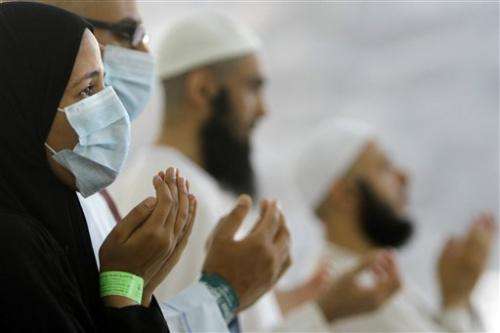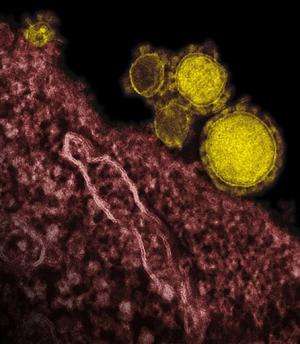Saudi Arabia reports 5 more deaths from MERS

Five more people have died in Saudi Arabia after contracting an often fatal Middle East respiratory virus as the number of new infections in the kingdom climbs higher, health officials confirmed Thursday.
The Saudi health ministry said in a statement posted online that the dead included two men previously confirmed to be suffering from the Middle East Respiratory Syndrome in the Islamic holy city of Mecca and another two in the holy city of Medina.
A 62-year-old woman who suffered from diabetes, high blood pressure and asthma also died, in Riyadh. She was one of 14 newly confirmed cases of the disease reported Thursday in the Saudi capital, and in the cities of Jiddah, Taif and Medina.
Authorities late Wednesday reported an additional 18 confirmed cases and four fatalities.
MERS belongs to a family of viruses known as coronaviruses that include both the common cold and SARS, or severe acute respiratory syndrome, which killed some 800 people in a global outbreak in 2003. MERS can cause symptoms including fever, breathing problems, pneumonia and kidney failure.
Not everyone who contracts the virus that causes MERS gets sick, while others show only mild symptoms. There is no cure or vaccine.
The latest figures bring to 463 the number of confirmed cases in Saudi Arabia, the site of most MERS infections. A total of 126 people in the kingdom have died from the virus since it was first identified in 2012.
The virus has since spread to other parts of the world, including the United States, which recently confirmed its first case in a health care worker returning from Saudi Arabia.

Scientists believe camels may play a role in primary infections. The disease can then spread between people, but typically only if they are in close contact with one another. Many of those infected have been health-care workers.
Among those who died this week after contracting the virus was a Filipino nurse working in Riyadh, Carmelita Dimzon, head of the Philippines' Overseas Workers Welfare Administration, said Thursday.
In Lebanon, Health Minister Wael Abu Faour ordered that thermal cameras be set up at Beirut's international airport to check arriving passengers for possible signs of fever, indicating a possible MERS infection, the official National News Agency reported. Lebanon has no recorded cases of the MERS virus so far.
A team of experts from the World Health Organization has completed a five-day mission to Saud Arabia to help health authorities there assess a recent rise in cases.
Their mission included meetings with health officials in the capital and visits to two major hospitals in Jiddah, which has been the site of a number of recent infections. The WHO noted that most human-to-human infections have occurred in health-care facilities.
Evidence so far suggests that a possible seasonal rise in incoming cases combined with insufficient infection prevention and control measures could be to blame for the rise in infections there, according to the WHO.
"Current evidence does not suggest that a recent increase in numbers reflects a significant change in the transmissibility of the virus," the WHO said Wednesday. "There is no evidence of sustained human-to-human transmission in the community and the transmission pattern overall remained unchanged."
It added that there is a "clear need" to improve medical workers' knowledge and attitudes about MERS.
© 2014 The Associated Press. All rights reserved.















